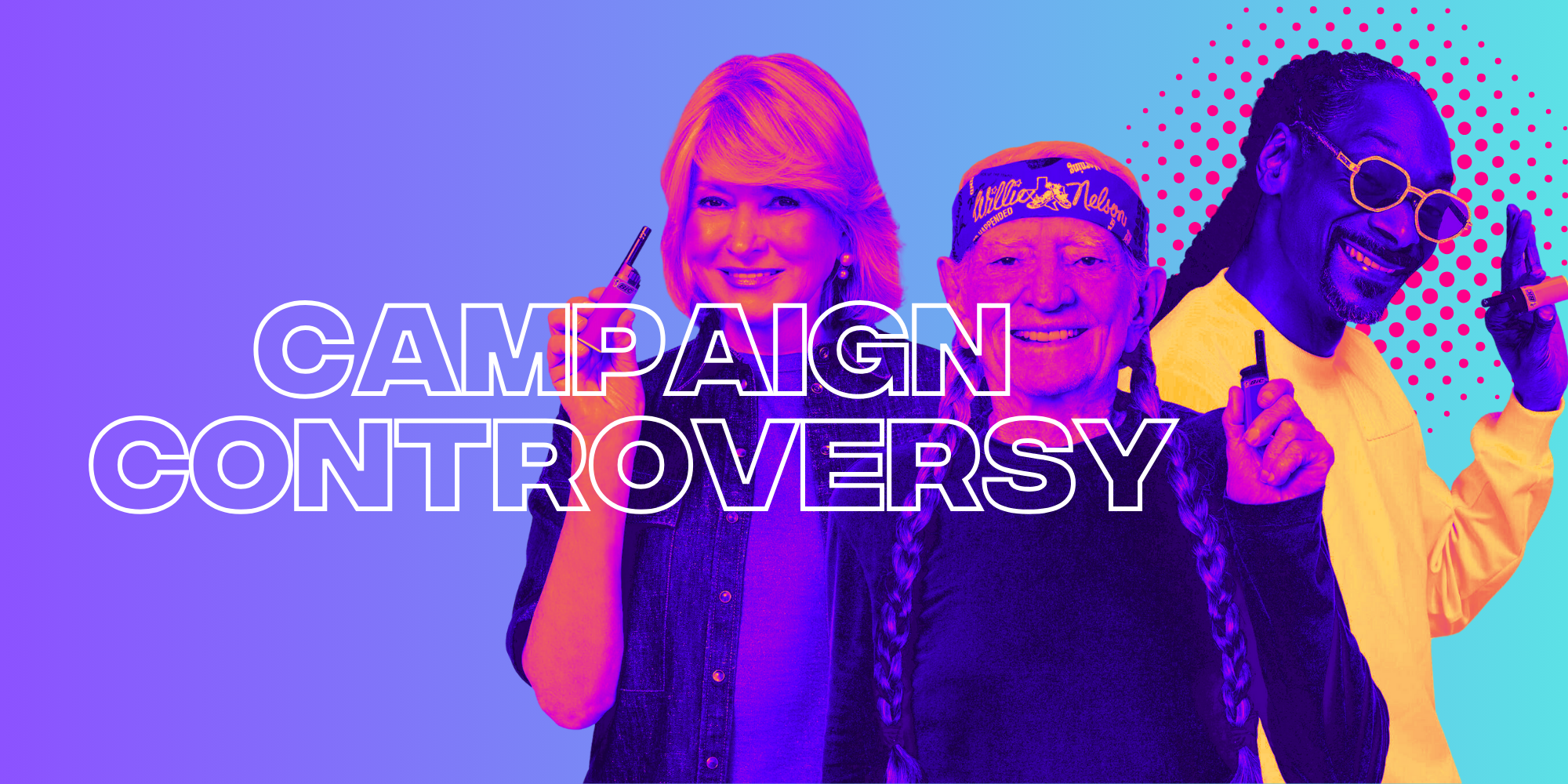Staying Cancel-Free: How Can Brands Avoid Controversial Marketing Campaigns?
May 21, 2024
Marketing News

As the famed saying goes, any publicity is good publicity; even when it comes to controversial marketing campaigns.
Yet, in 2024, is that really true?
It seems each day we awake to yet another brand fumbling a campaign, resulting in unintended controversy and an apology in the form of an Instagram post.
For modern consumers, brands should be a shining pinnacle of perfection. Controversial marketing campaigns and deliberately stirring the pot no longer fosters good-natured debate amongst consumers, but rather is a one-stop ride straight to cancel-town.
As such, how can brands be sure to steer clear of controversial marketing campaigns? Let’s take a look at what brands are doing it right, which ones are falling behind, and the top tips to ensure your brand steers clear of controversial marketing campaigns.
THE MODERN CONSUMER AND CONTROVERSIAL MARKETING CAMPAIGNS
The modern consumer has increasingly high standards for the brands they engage with.
Armed with unprecedented levels of media literacy thanks to TikTok, consumers no longer buy from brands absentmindedly. Instead, they take care to purchase from companies that deserve their support. Consumers want to support brands that uphold their own values, consider their impact on the world around them, and are genuine in their efforts across the board.
@fentybeauty #AAPIHeritageMonth Community Spotlight ❤️🔥 Meet Tiffany Nguyen, @tiffany (she/her), Vietnamese-American 🇻🇳 known on the Fenty Beauty marketing team as “Tiff-Tok” for her undeniable social expertise and for being one of the peeps responsible for some of your fave Fenty social moments 📸 Through embracing heritage and redefining norms, we’re celebrating her journey of turning her passion into her full-time career while navigating tradition. Tiffany never dreamt she would find herself in such a creative space getting to experience these life-changing moments but growing up under her dad’s entrepreneurial spirit and seeing her parents’ strong work ethic fueled her aspirations. Her story is an inspiration for the AAPI youth, encouraging us to not let the pressures of conforming to traditional Asian stereotypes discourage us when it comes to career pathing and to ALWAYS dream big. Follow along as we continue to uplift and share our unique array of #AAPI individuals dominating the creative industry!
Ultimately, consumers will not purchase or engage with brands that they would not be friends with.
Many brands have struggled to keep up with these new standards. Businesses frequently release campaigns that cause an uproar in their audiences, and require them to issue apologies.
Let’s take a look at some brands that have recently released controversial marketing campaigns, and take note of their mistakes.
CONTROVERSIAL MARKETING CAMPAIGNS
Bumble
@eldestdaughterclub wording matters!!!!!!!!! #bumble
Bumble’s major fumble has been the talk of the town this month, with consumers up in arms across the world.
The popular dating platform is known for its tongue in cheek, Gen-Z focused marketing, but its most recent campaign completely missed the mark. The campaign, formed of a series of billboards, seemingly shamed consumers for not engaging in sexual activity, and mocked those who opt for celibacy.
The now taken down billboards featured phrases such as “You know full well a vow of celibacy is not the answer,” and “Thou shalt not give up on dating and become a nun.” Consumers quickly rushed to the company’s social media to voice their displeasure at the clumsy marketing.
In an apology post on instagram, Bumble claimed that the campaign was intended to poke fun at modern dating, but instead unintentionally made fun of consumers who choose, or are forced, to live a celibate lifestyle.
@texasgardenfairy
All in all, Bumble found itself at the top of the list of 2024’s controversial marketing campaigns for three major reasons. First, the company failed to consider the diverse array of sexualities and experience with sexuality that its consumer base holds. Bumble’s target audience is predominantly younger people, who are statistically more likely to identify as Queer; which, of course, includes Asexuality.
Secondly, Bumble did not take into account the many reasons why a person may be celibate. Celibacy can be chosen for a variety of reasons, ranging from feminism (for example, engaging in South Korea’s 4B feminism movement), to a history of trauma. As such, these advertisements inadvertently shame consumers who may choose celibacy as a means of living life more freely and safely.
Finally, Bumble’s latest campaign does not align with its founding principles. Since its launch in 2014, Bumble has sought to carve out a more safe and hospitable space for women to date in. This campaign goes against this manifest, as it claims that Bumble is a place for sexually active daters only.
Evidently, Bumble can safely be added to the long list of controversial marketing campaigns, because the company failed to stay true to its roots, listen to its audience, and stay up to date with societal beliefs.
Now, which brands have been doing things right and avoiding controversial brand campaigns?
NON-CONTROVERSIAL MARKETING CAMPAIGNS
E.L.F
@elfyeah research so wild we had to make it into a billboard 🤯 learn more at changetheboardgame.com #elfcosmetics #eyeslipsface #changetheboardgame
E.L.F is quickly becoming known for its genius marketing campaigns.
The incredibly popular beauty brand is consistently on the ball with their advertising. They continue to produce high-quality campaigns that reach their target audience effectively and in an engaging manner.
How? They listen. They pay attention to what their consumers want and what sensitive topics they should avoid. They create campaigns that spark conversation, but do not deliberately offend.
One such example is their recent “So Many Dicks” campaign.
Released earlier this month, E.L.F’s “So Many Dicks” campaign seeks to call out the overwhelming number of men named Richard, Rick, or Dick in U.S board rooms. The campaign highlights that there are 566 men with these three names on U.S based boards of directors. This is in stark contrast to the mere 806 Black women, 774 Asian women, and 283 Hispanic women found in the 37,000 board members.
@elfyeah Billie is serving facts 👏👏 learn more at changetheboardgame.com #elfcosmetics #eyeslipsface #changetheboardgame
Clearly, there is an intensely heavy leaning in boardrooms towards men.
Part of its “Change The Board Game” initiative on corporate diversity, E.L.F aims to combat this problem in its latest campaign which was created in partnership with Oberland, a purpose-driven agency. Through a series of digital screens on Wall Street, New York City, E.L.F’s campaign highlights how many brands lean into diversity, inclusion and equity, all the while corporate America pulls back.
Ultimately, E.L.F’s campaign has succeeded for all the reasons Bumble’s didn’t.
Firstly, the campaign plays into E.L.F’s audience perfectly. A female, Gen-Z focused brand, campaigns that highlight social issues and genuinely give back to society perform incredibly well for E.L.F.
Secondly, the campaign caters to the strong desire in modern consumers for increased diversity and inclusion in businesses. Modern consumers champion brands that promote improved inclusivity, due to their own mission to transform society into a better place for all.
Finally, E.L.F has long been a staunch supporter of women’s rights and diversity. This most recent campaign is a small part of their broader mission to double the rate at which women and diverse members join corporate boards. As such, the campaign fits inline with the reputation that E.L.F has. It is genuine in this manner, and not a ploy merely for marketing purposes.
HOW TO AVOID CONTROVERSIAL MARKETING CAMPAIGNS
Ensuring your brand does not fall prey to any controversial marketing campaigns in 2024 is simple, if you stick by the following rules:
Understand your audience
It is essential that you have a solid, firm understanding of your target audience. Having a good grip on their values, beliefs and sensitivities ensures that you do not tread on any delicate areas. Remember that a campaign that speaks strongly to one group may alienate another, so weigh up your options carefully and choose wisely.
Ethics
It is crucial that as a brand you consider morals and ethics. Some topics are strictly off limits no matter what. Modern consumers – particularly younger ones – want brands that are a reflection of their own morality. Consumers will not purchase from brands that they would not be friends with.
Keep your message clear
Misinterpretation arises from ambiguous messaging. Leave no room for wondering or what ifs. Keep your message, and intentions, clear as a bell.
Always listen
As with any campaign, it is crucial that once it goes live you continue to monitor it and the public’s reaction to it closely. Practice good community management from the second your campaign hits public view, and be ready to jump in if consumers are confused. Be ready to adapt, apologize, and correct.
Think long term
Each campaign is a tiny piece in the puzzle that is your brand. You must think broadly, and pay careful consideration to how the campaign impacts your overall brand image. Be sure that it is inline with your goals, morals, and tone of voice. Stay true to your roots, rather than trying to switch things up too much and alienating your loyal fan base. Consistency and genuinity build brand loyalty, which is priceless.
IN THE END…
@elfyeah ready, set, let’s e.l.f.ing go Katherine Legge 🏁 catch us cheering on the only female driver at the Indy 500 as she tears up the track @Indianapolis Motor Speedway #Indy500 #elfcosmetics #eyeslipsface
Some claim that in our current era, it is impossible for brands to avoid controversial marketing campaigns. That no matter what a brand does, it will offend some group of people.
Yet, this is not a new phenomenon.
It has always been impossible for brands to appease every group in society. With the vast array of communities each with their own beliefs and needs, it is not realistic for a business to appeal to every single consumer.
What has changed, is that consumers now hold brands responsible for their actions. There is a difference between a campaign not appealing to every single human across the globe, and a campaign preying on minorities and being entirely tone-deaf.
Brands may not be able to gain the love of every consumer, but they can keep the love of their current fan base, and not cause offense – deliberately or accidentally – to consumers outside of their target audience.
Brands must simply stay aware of the changing social attitudes, and treat their consumers how they would like to be treated. Create campaigns that reflect your unique personality and cater to your audiences’ needs, wants, and beliefs. Listen to your audience, and create campaigns that suit them. Stay on top of what’s hot and what’s not. Uphold your morals and do not hesitate to take a stand for the issues that your brand stands for.
All in all, steering clear of controversial marketing campaigns in 2024 is entirely achievable for brands who are willing to put in the effort. Listen to your consumers, stay conscious of your role in society and the impact you have as a brand, and be genuine in all you do.
Follow these simple rules, and you are sure to dodge the controversial marketing campaigns bullet.
Our influencer marketing agency and social agency are located worldwide, with our agency network based in the USA, UK, UAE and China.
If you want to find industry insights, visit our influencer marketing and social media blogs.
@sociallypowerful
Social And Influencer Marketing News + Insights
Get in touch
We'll show you how to start powerful conversation, drive social engagement, build your brand, hit sales targets or meet other goals you have, wherever you are in the world.
Work with us





